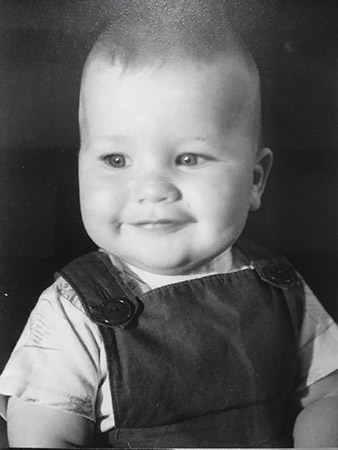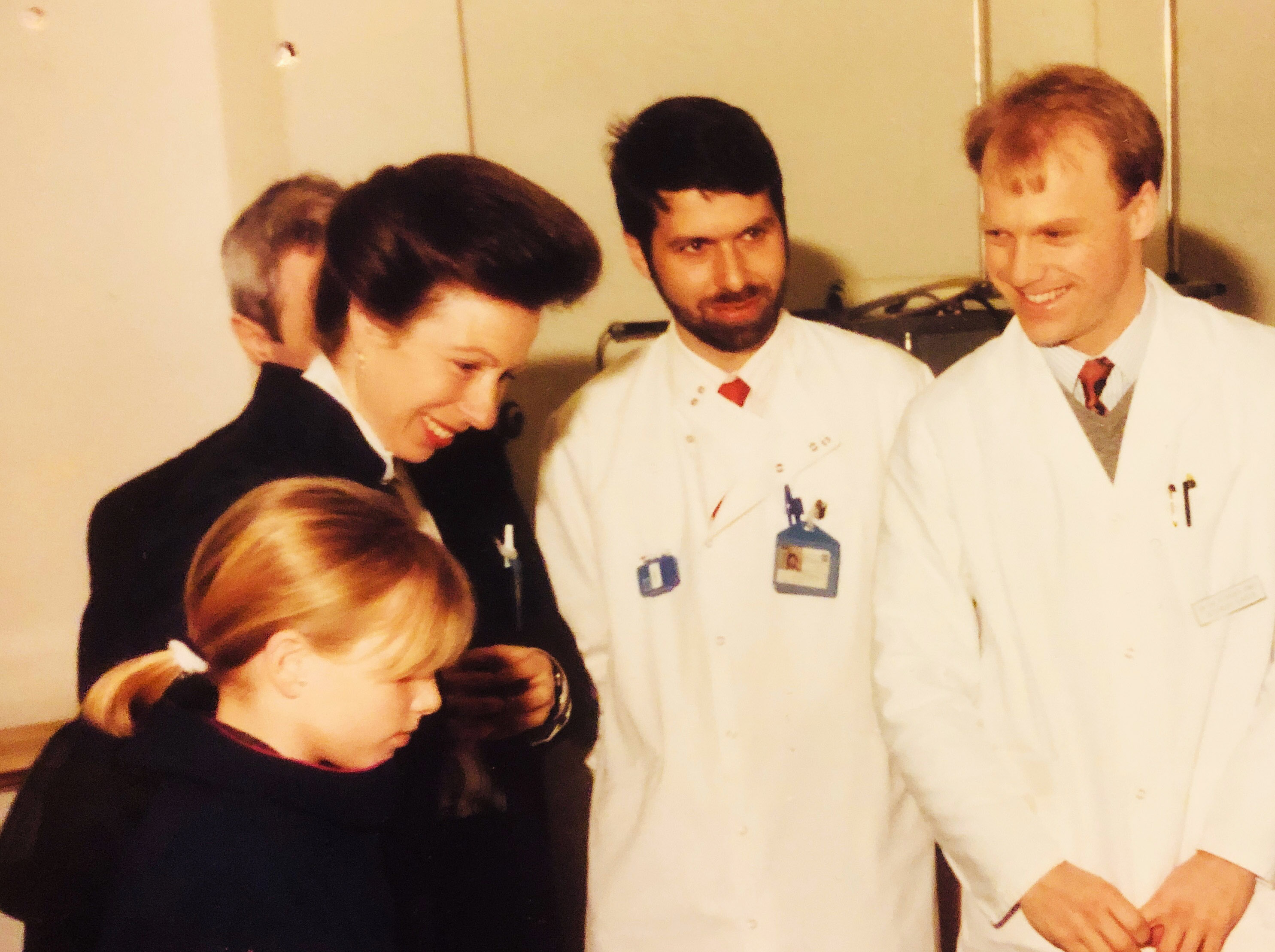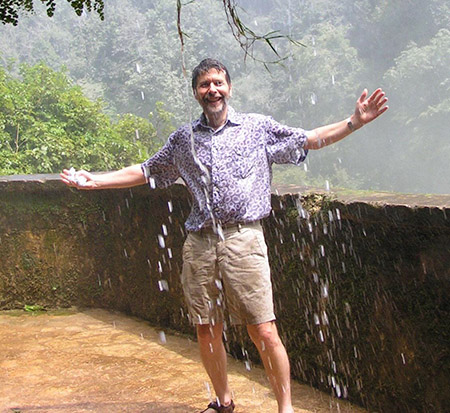Submitted by J. Hudson on Thu, 19/10/2023 - 11:58
Born in Headingley and living for most of his early years within ten minutes walk of the cricket ground, David’s first memories are
actually from the USA, as his father, an econometrician, used a Fulbright Scholarship to tour extensively with his family in that country between 1958 and 1960, before returning to Leeds. When aged seven, his family moved south, to Watford, where he later attended the local state grammar school. Attracted to the biosciences by early reading of Gerald Durrell and of Rachel Carson’s Silent Spring, he was effectively put off chemistry by working for part of a post-school gap year as a technician almost full time in dark rooms, developing novel instant film emulsions at Kodak, Harrow.
David then had a first spell in Cambridge doing the Natural Science tripos and ending up in the rapidly developing area of genetics. A PhD followed, in biochemistry at UCL, finding out whether DNA stayed on nucleosomes during transcription by RNA polymerase 2. There he met his future wife Helen and on completion of the PhD got married, and then gained a Royal Society travelling fellowship. As a result, during the first four months of this marriage David was based in Geneva whilst Helen was still working in London, an excuse for monthly romantic meetings in a left bank hotel in Paris, facilitated by the then brand new TGVs (Trains de Grande Vitesse).
After that he and his wife went to Baylor College of Medicine in Houston, Texas where he worked on the genetics and biology of what had been identified by an antibody prior to the start of his project as the oestrogen receptor, but he and his colleagues showed to be a closely associated but more abundant heat shock protein, HSP90, later termed a molecular chaperone. Helen was not happy with her job or the environment in Houston, and after about two and a half years David returned with her to take up a job as a lecturer at The Royal Dick Veterinary School in Edinburgh. HIV was a very scary problem at that moment, and he decided to work with Prof Ian McConnell on Maedi-Visna Virus, the best characterised lentivirus at that time.
During eight happy years in Edinburgh his first child, James, was born, and through interaction with Simon Petersen-Jones, then the senior ophthalmologist at the Dick Vet, who wanted tests for single gene retinal diseases in dogs, he developed his own interest in the very rapid evolution in morphology that had occurred after their domestication from wolves. His chance to develop these interests came when Prof McConnell moved back to Cambridge and invited him to apply for a lectureship here. So he arrived here in 1994, and whilst initially continuing work on Visna, gradually handed this interest over to Dr Blacklaws. Simultaneously he developed the interest in dog genetics with a string of PhD students, including Dr Petersen-Jones, who bravely took a step backwards in order to move forward (and is now a Professor at Michigan State University). In 2007 David won the Blaine Award of the BSAVA on their 50th anniversary, for his “contributions to advances in small animal medicine and surgery.”
Already, in Edinburgh, David had developed an interest in how postgraduates were taught, seeking to enhance the breadth as well as the depth of their knowledge, and had become responsible for some aspects of co-ordinating graduate studies and in particular graduate welfare there. The clinical teaching programme on site here had little use for a man without a veterinary qualification, so he took on a small amount of undergraduate teaching in genetics and biochemistry, but started to develop what became a series of major roles in postgraduate affairs in the University. He has served on the Degree Committee for Clinical Medicine and Veterinary Medicine over almost the whole of his working life in Cambridge, chairing it for seven years, and also on the Degree Committee for the Faculty of Biological Sciences for about the last ten years. Of everything he has done in his career he is most proud of having steered the Postgraduate School of Life Sciences from being an idea shared by Prof Joe Herbert, Prof Ken Siddle and a few others in meetings, to a reality. Over a period of about five years, he coined the name, led the School (with huge assistance from Dr Laurie Friday) and partly in response to central government pressure, helped set in motion much more extensive central training for PhD students and postdocs. He co-ordinated and largely wrote the first and final drafts of the first BBSRC Cambridge Doctoral Training Partnership program.
At various times he has served in many other roles in the general area of postgraduate affairs including membership of the Board of Graduate Studies, directing the Cambridge A-Star* Institute PhD Programme (Singapore), Directing the MRC Doctoral Training Partnership for a year when Prof Siddle was on sabbatical, and working on a large number of other committees with various special purposes in this area. Most recently he has been chairing the Training Committee for the current SBS and BBSRC Doctoral Training Partnerships and helped write the recent successful bid to regain BBSRC funding for this programme. Within the Department, he has for many years been Director of Postgraduate Education, and introduced the use of a Departmental postgraduate education committee to share the responsibility of ranking Cambridge funded studentships and in other roles. As DPgE he has been immensely helped by a number of Postgraduate Administrative Officers (for which read “managers”) of whom Fiona Roby and before her Meg (Fred) Staff deserve special mention as the people who have really kept this part of David’s work functioning. In 2020 David won a Pilkington Teaching Prize for his contributions to postgraduate teaching.
Outside work, David is well known by the department as a keen cyclist, and by some as a gardener (although this is something he will need to devote more time to in retirement as the last years have been busy and his large garden is currently a mess!) He also sings as a bass in his local community choir, and when he has time, paints watercolours. However, he will still be seen around the Department, thanks to a recent and generous bequest which will fund his research for the next couple of years. He is looking forward to being able to give more time to that!
Professor Sargan's knowledge and expertise will be very much missed by the Department and a drinks celebration to toast David's retrement was recently held. We wish him the best for the future but grateful we will see him from time to time around the building while he continues his research.



